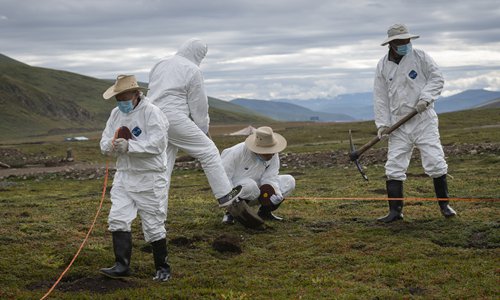HOME >> SOURCE
What should be known about hantavirus case in China amid COVID-19 pandemic?
Source:Global Times Published: 2020/3/24 22:53:40

Mice control team works in Ganzi, Southwest China's Sichuan Province to examine the population of the rodent and test whether they carries plague bacteria in September 2019. Photo: VCG
A hantavirus case reported in China amid the coronavirus pandemic has sparked interest online.
A migrant worker from Lincang, a city in Southwest China's Yunnan Province, died suddenly on Monday when passing through Ningshan, Northwest China's Shaanxi Province, on the journey back to work. The worker tested positive for the hantavirus and negative for COVID-19.
No hantavirus cases were reported previously and an investigation has been launched to cope with the case, according to the Xinhua News Agency, citing a circular released on Tuesday by the local health commission in Lincang.
The city has swiftly started monitoring and screening for the disease and an epidemiological investigation is being conducted. A special team has been dispatched to Ningshan county for a response, per the circular by the local health commission.
An earlier circular by Ningshan county said that the migrant worker whose surname was identified as Tian, a staffer with an aquatic food company in East China's Shandong Province, felt indisposed when passing through the county and died after all rescue measures failed at 7am on Monday.
Samples of an additional two people with fever and other people accompanying Tian were submitted for testing.
Patients infected with hantavirus will show symptoms including fever, bleeding and kidney damage, Chinese media reports said, citing infectious disease experts with the Chinese Center for Disease Control and Prevention.
The incubation period of the hantavirus is usually seven days to two weeks, with rare cases showing symptoms as short as four days or as long as two months. Early symptoms include exhaustion, vomit and reddish cheeks.
Humans can contract the hantavirus from infected rodents, from either rural areas or a domestic environment such as pet rodents. Humans can also contract it from aerosols from a rodent's feces or urine or via contact with the eyes, nose or mouth. Humans can also be infected by a bite by infected rodents.
There has been no direct person-to-person transaction so far reported, according to media reports.
In China, vaccines for the hantavirus have been on the market for nearly 20 years, and taking vaccines is seen as the most effective way to prevent hantavirus infection. Immunological studies have shown a protection rate of 92 percent six years after fundamental immunology, suggesting most people do not need a second vaccine shot for the hantavirus, media reports said.
China has mandated vaccine programs for the hantavirus in high-risk regions and groups since 2008.
Posted in: ECONOMY